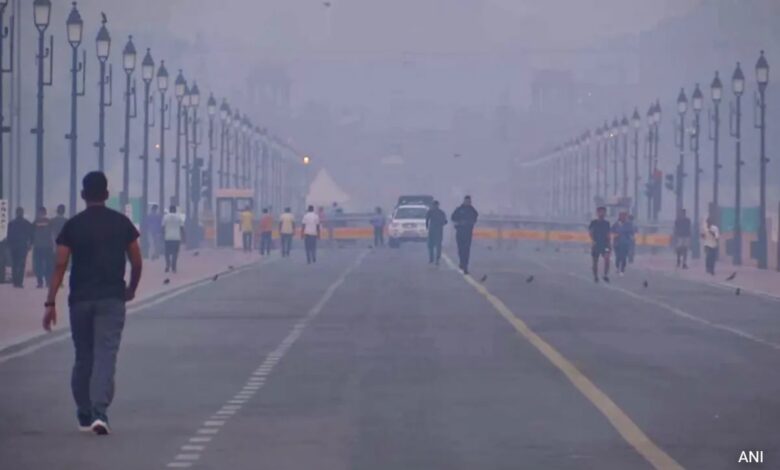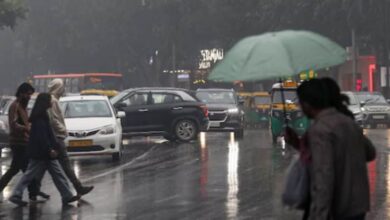GRAP Stage 2 Invoked In Delhi-NCR As Air Quality Worsens. What It Means


Delhi air quality index has worsened in the past few days
New Delhi:
With the air quality index (AQI) in Delhi worsening in the past few days, the Commission for Air Quality Management (CAQM) has invoked stage two of the anti-pollution plan GRAP this morning.
As per the real-time data provided by the System of Air Quality and Weather Forecasting and Research (SAFAR), the AQI in Delhi at 8 am was recorded at 317, which falls under the “very poor” category.
An AQI between 0 and 50 is considered good, 51 and 100 satisfactory, 101 and 200 moderate, 201 and 300 poor, 301 and 400 very poor, 401 and 450 severe, and above 450 severe-plus.
According to a forecast by the India Meteorological Department (IMD), the daily average AQI of Delhi is expected to stay in the ‘very poor’ category in the coming days owing to unfavourable meteorological and climatic conditions.
Under stage two of the GRAP or the Graded Response Action Plan, there will be restrictions on the use of coal and firewood as well as diesel generator sets in the Delhi-National Capital Region (NCR).
ALSO READ | Delhi Air Pollution, Ahead Of Winter, Raises Respiratory Illness By 15%
Mechanical sweeping and water sprinkling on identified roads will also be carried out on a daily basis, and dust control measures will be enforced at construction and demolition sites.
Further, traffic personnel will be deployed at congestion points, vehicle parking fees will be increased to discourage private transport and additional bus and metro services will be started.
People have been advised to use public transport and minimize the use of personal vehicles. They also have been asked to regularly replace air filters at recommended intervals in their automobiles, and avoid dust-generating construction activities from October to January.
People in Delhi-NCR also have been told to avoid the open burning of solid waste and bio-mass.
These steps are in addition to the GRAP Stage 1 measures, that have been in effect since October 15. During Stage 1, there is periodic mechanised sweeping and water sprinkling on roads, besides dust mitigation at construction sites. There is also a ban on the open burning of waste, the use of coal or firewood in eateries and there is a limited use of diesel generators.
Restrictions During Stage 3
Stage 3 of the GRAP is imposed when the AQI remains between 401 and 450. These are the steps that are then taken:
More frequent mechanised road sweeping and daily water sprinkling along with dust suppressants, before peak traffic hours, on roads and hotspots.Further intensify public transport services with rates to encourage off-peak travel.Stop mining and stone-crushing activities.Strict restrictions on BS lll petrol and BS lV diesel LMVS (4 wheelers), strict restrictions on Delhi-registered Diesel operated Medium Goods Vehicles (MGVS) to BS-lll standards, BS-lll and below diesel operated LCVS (goods carriers) registered outside Delhi not permitted to enter Delhi, lnter-State buses from NCR states other than EVs/CNG/BS-Vl diesel, to not enter Delhi,Possible discontinuing physical classes in schools for children up to Class V.Strict curbs on construction and demolition activities.Restriction During Stage 4, When AQI Is Above 450
Stage 4 of the GRAP is implemented when the AQI in Delhi reaches the severe-plus category, which is when it crosses 450.
These are the steps that are then taken:
Entry of trucks into Delhi is stopped.Ban on construction and demolition activites for linear public projects such as highways, roads, flyovers, overbridges, power transmission, pipelines, telecommunication etc.The government can discontinue physical classes, including for Classes Vl – lX and Class Xl.The government can take a decision on allowing public, municipal and private offices to work on 50% strength and the rest to work from home.State governments may consider additional emergency measures like the closure of colleges/educational institutions and closure of non-emergency commercial activities, permitting the running of vehicles on the odd-even basis of registration numbers etc.Children, the elderly and those with respiratory, cardiovascular, cerebrovascular, or other chronic diseases to avoid outdoor activities and stay indoors.
Earlier on Monday, the Delhi government also launched its “Red Light On-Gaadi Off” campaign to fight air pollution.
Kicking off the campaign at the ITO intersection, Delhi Environment Minister and senior Aam Aadmi Party (AAP) leader Gopal Rai appealed to drivers to help reduce pollution by turning off their vehicle engines at red lights.
आज ITO रेड लाइट से ‘Red light On, Gaadi Off ‘ अभियान की शुरुआत।
इस दौरान गाड़ी चालकों से ‘Red light On’ होने पर ‘Gaadi Off’ करके प्रदूषण कम करने में अपना योगदान देने की अपील की। pic.twitter.com/dKcUfBP58s
— Gopal Rai (@AapKaGopalRai) October 21, 2024
Mr Rai also said that the Delhi government has set up a green war room to combat pollution, launched an anti-dust campaign to control dust pollution, and is spraying bio-decomposer over 5,000 acres to decompose stubble.




